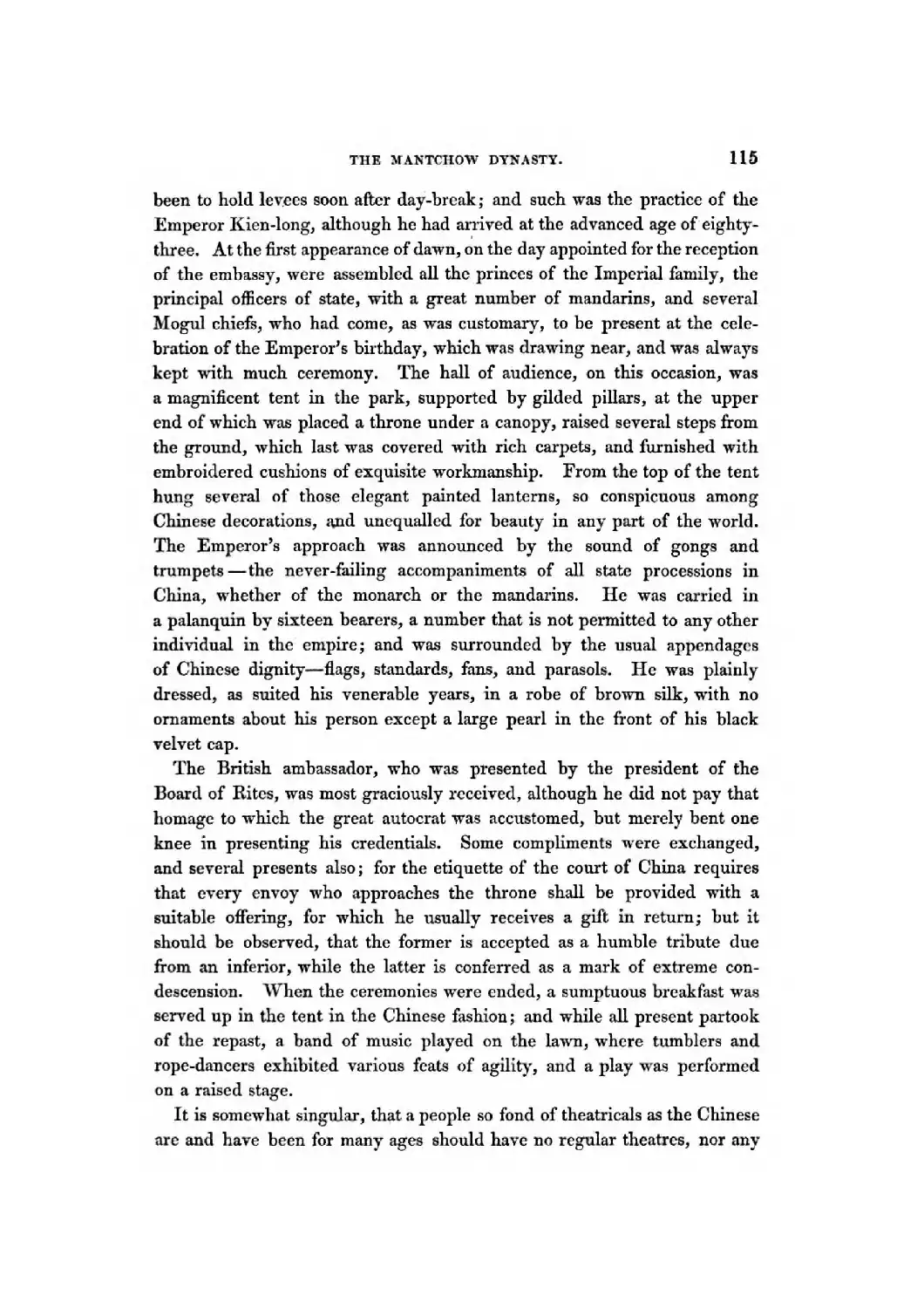The History of China and India
- Info
- Pages
- Transcript
- Related
The British ambassador, who was presented by the president of the Board
of Rites, was most graciously received, although he did not pay that
homage to which the great autocrat was accustomed, but merely bent one
knee in presenting his credentials. Some compliments were exchanged, and
several presents also; for the etiquette of the court of China requires
that every envoy who approaches the throne shall be provided with a
suitable offering, for which he usually receives a gift in return; but
it should be observed, that the former is accepted as a humble tribute
due from an inferior, while the latter is conferred as a mark of extreme
condescension. When the ceremonies were ended, a sumptuous breakfast was
served up in the tent in the Chinese fashion; and while all present
partook of the repast, a band of music played on the lawn, where
tumblers and rope-dancers exhibited various feats of agility, and a play
was performed on a raised stage.
It is somewhat singular, that a people so fond of theatricals as the
Chinese are and have been for many ages should have no regular theatres,
nor any actors of celebrity; but in this, as in all other respects,
their taste and genius are stationary. They have no scenery, but very
fine dresses; and as no women are allowed to appear on the stage, the
female characters are always performed by boys.
At Zhehol, the ladies of the court had a theatre for their own especial
amusement, where plays were acted every day, and were sometimes attended
by the Emperor and his ministers, but more frequently by the ladies
only, who, having but little occupation, naturally fly to any frivolous
pursuit that may help to beguile the time. One of their greatest
enjoyments was to form parties of pleasure on the canal, for which
purpose there were yachts always in readiness, fitted up in the most
elegant manner, but so contrived that the fair occupants were entirely
screened from observation.
There was no Empress at the period, for the princess who had enjoyed
that dignity was dead, and Kien-long had not thought proper to raise
another to the throne. The laws of China admit of only one lawful wife;
but the Tartar sovereigns do not restrict themselves to this rule,
although they generally give to one a rank above the rest, and she alone
is called Empress, while the others have the title of queen. There were
eight queens at this time, two of the first and six of the second rank;
and these had each a certain number of ladies in her train, making
altogether upwards of one hundred females belonging to the court. As
long as the Emperor lives they probably lead pleasant lives, but their
subsequent lot is not very enviable; as they are then removed to a
building near the palace which may be termed a nunnery, since they are
obliged by the customs of the country, to pass the remainder of their
lives within its walls, in utter seclusion.
The English visitors staid a week at Zhehol, and were present at the
anniversary of the Emperor’s birthday, which is a holiday throughout the
empire. The ceremonies of the court consisted principally in the grand
Birthday Ode, sung in chorus by voices innumerable, accompanied by
deep-toned bells and solemn music. The Emperor was present, but not
visible, being seated behind a screen in a large hall, where all the
courtiers were assembled in their state-dresses to pay the customary
homage, which was done by falling prostrate at the conclusion of every
stanza of the Ode, which has been thus translated, “Bow down your heads,
all ye dwellers on the earth; bow down your heads before the great
Kien-long!” an exhortation that was literally obeyed.
The two or three days that succeed the birthday are entirely devoted to
festivities, in which all classes participate; the rich in visiting or
receiving their friends with feasting, the poor in such enjoyments as
their station enables them to obtain.



